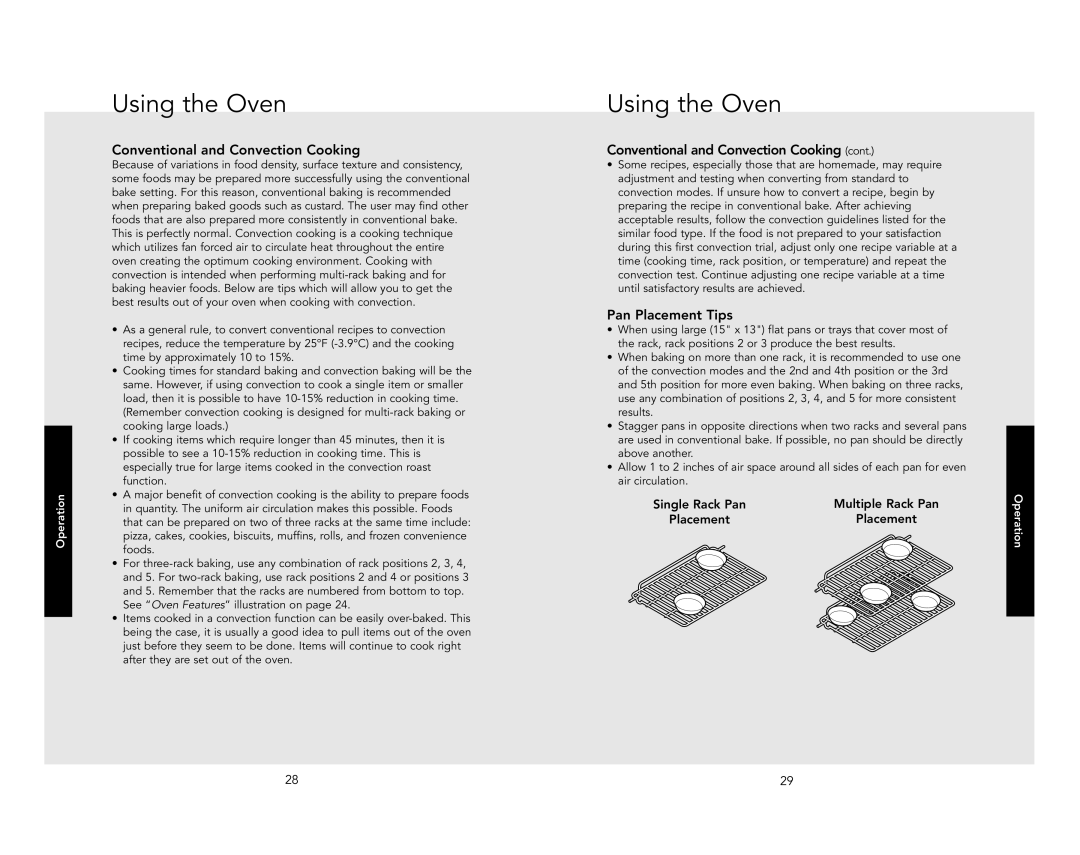
Operation
Using the Oven
Conventional and Convection Cooking
Because of variations in food density, surface texture and consistency, some foods may be prepared more successfully using the conventional bake setting. For this reason, conventional baking is recommended when preparing baked goods such as custard. The user may find other foods that are also prepared more consistently in conventional bake. This is perfectly normal. Convection cooking is a cooking technique which utilizes fan forced air to circulate heat throughout the entire oven creating the optimum cooking environment. Cooking with convection is intended when performing
•As a general rule, to convert conventional recipes to convection recipes, reduce the temperature by 25°F
•Cooking times for standard baking and convection baking will be the same. However, if using convection to cook a single item or smaller load, then it is possible to have
•If cooking items which require longer than 45 minutes, then it is possible to see a
•A major benefit of convection cooking is the ability to prepare foods in quantity. The uniform air circulation makes this possible. Foods that can be prepared on two of three racks at the same time include: pizza, cakes, cookies, biscuits, muffins, rolls, and frozen convenience foods.
•For
•Items cooked in a convection function can be easily
Using the Oven
Conventional and Convection Cooking (cont.)
•Some recipes, especially those that are homemade, may require adjustment and testing when converting from standard to convection modes. If unsure how to convert a recipe, begin by preparing the recipe in conventional bake. After achieving acceptable results, follow the convection guidelines listed for the similar food type. If the food is not prepared to your satisfaction during this first convection trial, adjust only one recipe variable at a time (cooking time, rack position, or temperature) and repeat the convection test. Continue adjusting one recipe variable at a time until satisfactory results are achieved.
Pan Placement Tips
•When using large (15" x 13") flat pans or trays that cover most of the rack, rack positions 2 or 3 produce the best results.
•When baking on more than one rack, it is recommended to use one of the convection modes and the 2nd and 4th position or the 3rd and 5th position for more even baking. When baking on three racks, use any combination of positions 2, 3, 4, and 5 for more consistent results.
•Stagger pans in opposite directions when two racks and several pans are used in conventional bake. If possible, no pan should be directly above another.
•Allow 1 to 2 inches of air space around all sides of each pan for even air circulation.
Single Rack Pan | Multiple Rack Pan |
Placement | Placement |
Operation
28 | 29 |
